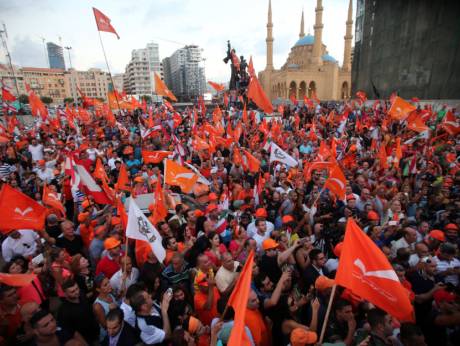
By: Joseph A. Kechichian,Senior Writer
Beirut: A few thousand Lebanese supporters of presidential hopeful Michel Aoun gathered Wednesday night in Martyrs’ Square in downtoan Beirut following his call on Saturday to protest against the extension of terms of top security posts.
However, conspicuously missing from the rally were Hezbollah supporters, traditional allies of the FPM.
Their lack of presence could be explained by a recent meeting between Iranian foreign minister Mohammad Zarif with Hezbollah leader Hassan Nasrallah, of which the details were not revealed.
However during a meeting with Lebanese foreign minister Gebran Bassil (also Aoun’s son-in-law), Zarif stressed his support for the current government, in a move that signaled a possible change in tactics by Iran from instagator to mediator.
The protest was rather festive as several demonstrators opened bottles of champagne and smoked cigars, in a jibe at Lebanese army chief Jean Qajwaji, who was photographed a few days prior celebrating his term extension.
Bassil asserted that he was “struggling like the FPM youth [and that] tomorrow, [he would] struggle inside the Cabinet.” He hammered: “The country is ours and we will stay in it,” even if no one said the opposite, adding, “by taking to the street, the FPM supporters are demanding the Christians’ rights, which concern all the Lebanese in general because water, electricity, oil and garbage are issues that concern all the Lebanese without exceptions.” General Michel Aoun’s son-in-law told the National News Agency: “The presidency is the right of Christians and the Free Patriotic Movement has the biggest share in Parliament,” which was interpreted as an Aoun call to arms against the government.
Ironically, Speaker Nabih Berri—who earlier declared that he would not vote for Aoun—did not even bother to attend the parliamentary session to hold a presidential election, as he was busy with his meeting with Zarif. For the 27th time running, lack of quorum essentially meant that no one could be elected to succeed former President Michel Sulaiman, whose term ended on May 25, 2014. FPM and Hezbollah deputies have thwarted quorum since April 2014 by boycotting parliamentary sessions, but two of its tenors, Bassil and Education Minister Elias Bou Saab, joined demonstrators outside parliament to step-up pressure on the government. While neither Bassil nor Bou Saab were deputies—as Bassil never won an election—and, therefore, could cast a ballot, it did not occur to the FPM officials to mobilize their deputies and actually proceed to vote for their candidate.
On Thursday Prime Minister Tammam Salam convened the Cabinet to discuss urgent issues, though FPM ministers planned to raise their two main concerns, the government’s working mechanism and the appointment of top military and security personnel. Salam, for his part, held a different agenda, which includes the growing garbage management crisis and 740-million-dollars worth of international loans that need approval before Lebanon looses them permanently. Given these diametrically opposed perceptions of what were the country’s priorities, observers expected the latest session to be contentious. Under the circumstances, and if no agreement could be reached, it was unclear whether Aoun would then give the green light for his supporters to resort to the streets once again. According to the pro-Hezbollah daily Al Safir, however, a high-ranking FPM source confirmed that the movement’s next moves hinged on “how others will deal with our known demands.”



